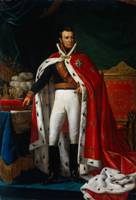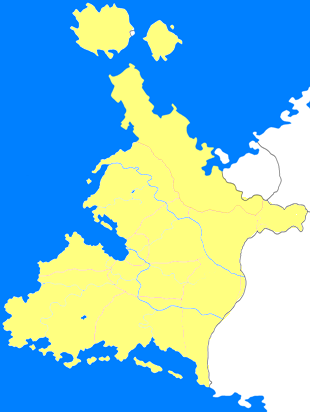Oogstmaand Monarchy
| Koninkrijk Batavië
kóninkreik bátÁvieju | |||
|
← | |||
|
| |||
|
| |||
| Official language: | Batavian | ||
| Capital: | 's Koningenwaarde | ||
| Largest cities: | Davignon, 's Koningenwaarde | ||
|
| |||
| Population: | |||
|
| |||
| Government: | Constitutional monarchy / emergency government | ||
| Head of state: | King Arkadius III des Vinandy | ||
| Head of government: | King Arkadius III des Vinandy | ||
| Currency: | Kruys | ||
"Het heeft Ons genoodzaakt drastisch te moeten ingrijpen. Het land verkeert in hoge nood nu het Lagerhuis niet langer meer operationeel is."
- Arkadius III during His speech to the Hogerhuis, 1579 AN.

The Harvest Month Monarchy, or Oogstmaandmonarchie or Oogstmaand Monarchy, is a term to refer to the period in Batavian history in which a state of emergency was declared by the king between in 1579 during the harvest month according to the Batavian calendar. It meant the end of the Second Kingdom of Batavia and would form the basis of its Third Kingdom in 1581.
In the late 16th century, the Batavians were confronted with increasing polarization and economic stagnation. While the population itself did not see a decline in living standards, it remained the same as thirty years before. A stagnation in population at a time when other Benecian nations were seeing their populations grow further caused the economic engine to sputter. However, the failure of Prime Minister Max van Bunthe-Uné to call new elections on time increased the unrest exponentially. To prevent the country from collapsing, the king personally intervened (as he was allowed to do through use of his constitutional powers to dissolve the Constitution and replace it with a new Statute), in consultation with the Hogerhuis, to reform the Constitution and adapt it to the needs of the time.
Government
Rijksregering (Royal Cabinet)
The Harvest Month monarchy did not have its own prime minister. Instead, the King took on that role. Two ministers were appointed to restart the National Government in anticipation of a new elected government.
- Arkady III
- General Affairs
- Finances
- Foreign Affairs
- Constantine Windsor
- Economics
- Education and Culture
- Harald van Gasconje
- Home Affairs
- State security
All in all, the national government achieved some small, but not unimportant, successes: first of all, it prevented the implosion of the Batavian government system. It managed to modernize some of the country's old laws and stabilize the economy.
Noodparlement (Emergency Parliament)
To avoid being seen as an abuse of royal pejorative, the King opened the Plenary Hall of the Lagerhuis to establish an Emergency Parliament. All citizens registered as Political Active Citizens were welcome to participate in the debates. Since the exhaustive debates could often go on for days at a time, and participating in the Plenary Hall required participants to be present at all times and to have their own property (to prevent vagrants from taking up the seats), participation continued limited to small groups of delegates from the provinces.
While the original idea was that the emergency parliament would limit itself to the bare minimum, the government took advantage of the moment of political stability to push through new laws (which had already been discussed by the previous government). This led to limited criticism from the Flemish president Gert Geens, among others, but domestic protest and grievances remained fairly limited.
